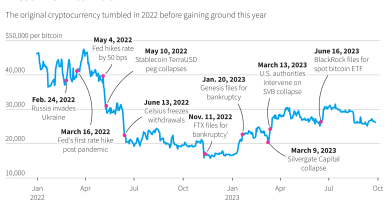Sam Bankman-Fried Sentenced To 25 Years In Prison

There is no possibility of parole in federal criminal cases, but Bankman-Fried can still shave time off his 25-year sentence with good behavior.
“SBF may serve as little as 12.5 years, if he gets all of the jailhouse credit available to him,” Mitchell Epner, a former federal prosecutor, told CNN.
Federal prisoners generally can earn up to 54 days of time credit a year for good behavior, which could result in an approximately 15% reduction.
Since 2018, however, nonviolent federal inmates can reduce their sentence by as much as 50% under prison reform legislation known as the First Step Act.
Epner says the First Step Act was billed as a civil rights measure, to help minority offenders who committed non-violent drug-trafficking offenses.
“It has turned out to be an enormous boon for white-collar criminal defendants, who are already given much lower sentences … than drug-traffickers,” Epner added.
There is also a provision that allows a court to reduce a person’s sentence for extraordinary and compelling reasons, which are often medical, according to Jordan Estes, a former federal prosecutor who is now a partner at Kramer Levin.
“Since the pandemic, courts have been more willing to grant early release under this provision if the defendant has served a substantial portion of his or her sentence,” Estes said.
READ MORE HERE



